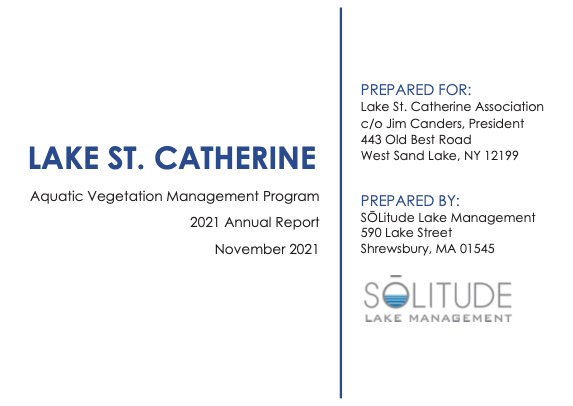Each season, the LSCA implements a Milfoil Control Program to keep milfoil in check in Lake St. Catherine using a combination of spot herbicide treatments and DASH (Diver Assisted Suction Harvesting).
This year, we expanded our program to include:
- An educational campaign called, "Stop The Spread", and a community meeting at the Wells Lakeside Park to inform lake residents and boaters of best practices to limit the spread of milfoil.
- Partnering with the LSCCF and arranging a 3-year plan to address the milfoil in Little Lake. Equal contributions consisting of donations from the lake community and funding from the LSCA and LSCCF paid for the ProcellaCOR treatment as part of the year 1 plan.
- A Milfoil Cleanup Community Day in which volunteers collected floating milfoil and other weeds to deposit at drop-off points in the Channel and on Little Lake. This planned one day event in July extended throughout the rest of the season as boaters & kayakers continued to collect and deposit the weeds. The LSCA DASH team handled the Community Day pickup, and the LSCCF harvesting crew made the pickups for the rest of the season.
These efforts led to another successful year of milfoil control on Lake St. Catherine.
In late September, our contractor SOLitude Lake Management performed a comprehensive, 2 day lake-wide aquatic vegetation survey to both evaluate the performance of our milfoil control efforts, and to assess the overall state of aquatic plants in Lake St. Catherine.
Back in 2001, 199 GPS points were plotted throughout Lake St. Catherine, and these points are evaluated for aquatic plants during each report. This is the 18th consecutive year a plant survey has been performed on Lake St. Catherine. You can see all the previous reports, dating back to 2004 in our Links & Downloads section.
The full report can be read here: 2021 - Aquatic Vegetation Management Report. We encourage you to take a few moments to read through the whole report.
Some information from the report:
- Milfoil cover percent, which represents the abundance of milfoil in the lake, is at its lowest point for the entire lake since 2010 at 3%. For reference, before the whole lake treatment in 2004, the milfoil cover percent for the entirety of Lake St. Catherine was 49%.
- Specifically in Little Lake in 2021, milfoil cover percent was at 5%, down from 36% in 2020.
- Of the 199 GPS data points in Lake St. Catherine, 43 are in Little Lake. Milfoil frequency of occurrence (FOC) refers to the percentage of GPS points at which milfoil was found. In 2021 in Little Lake, milfoil frequency of occurrence was at 28%, down from 98% in 2020.
- A potential treatment in Little Lake in 2022 is estimated at approximately 25 to 30 acres. For reference, the 2020 treatment area was 70.2 acres.
- With the exception of a few GPS points in the Big Lake at which milfoil was found, only trace levels were seen (single stems).
Based on the data, and the results we've all seen throughout the whole of Lake St. Catherine, our Milfoil Control Program had a very successful year. The ProcellaCOR treatments were highly effective, our DASH team did another great job this year (read about that by clicking here), and you got involved as well by participating and volunteering to collect floating milfoil from July to September as part of our Milfoil Cleanup Community Day (read about that by clicking here). We also heard numerous reports throughout the season of folks removing milfoil from their props, their shorelines, and if it happened to float by their dock.
For 2022, we hope to expand the volunteer milfoil cleanup program by beginning much earlier in the season. We have also applied for a grant which could fund the purchase of floating drop-off platforms and other equipment that would assist our volunteers. We should hear about this grant soon!
In early May, the lake will again be surveyed for milfoil growth. At that point, a final treatment map will be created which will show proposed spot treatment and DASH locations.
We'll be sure to keep you up-to-date on our 2022 efforts as work continues over the winter and into the spring.
If you have any questions, please get in touch at info@lakestcatherine.org.
Thank you for your continued financial and volunteer support as we work to keep milfoil under control in Lake St. Catherine! Let's keep working together!
